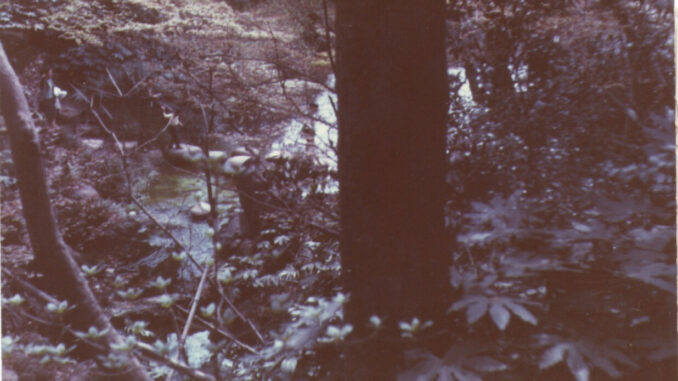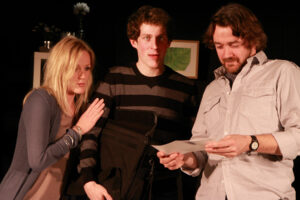
I Remember Green is the most recent production from the Theatre West – Picture This series, which sees writers take cue from a single hat-drawn photograph to produce a short performance. Working from a stark woodland scene, Heather Lister brings us an intense probe into the lives of a broken family who are haunted by the memories of a single day in the greens of a forest.
The play works retrospectively from the day that blind teenager Sam (Andy Kelly) is due to leave for University. Staring slightly above the audience, Sam recounts and explores the fractured series of events that saw his parents come to inhabit the state of separation in the present day. His thoughtful monologues and asides to the audience are punctured abruptly by the incessant bickering of his parents who, try as they might, cannot seem to reconcile their conflicting memories of the past. But ironically, with the aid of a strategic lighting system, it is Sam who is able to divine a sense of clarity from these events with a sense of wisdom and wit. The spotlight is used artfully to bring characters and events into focus as if conjured from the depths of Sam’s mind. Whilst allowing the audience to assume what they can from these events, Lister uses this process to explore the very act of remembering. As the Mother, Ellie (Suzanne Hampton) laments, “But we think in pictures! How is he supposed to have memories if he can’t see?!”

With only one small set consisting of a sofa, shelves, guitar and rug, Director Andy Burton has achieved an earnest sense of domestic claustrophobia on a low budget. Ellie and Jim (Daniel Winter)’s crumbling relationship feels truly unavoidable and it is easy to imagine Sam sitting in the corridor hearing, and in a sense, seeing it all. But perhaps the play could have benefited from at least one extra set to break the domestic tension which, far from building up as the play progresses, is fully let loose from start.
In contrast to the outbursts and vicious snipes, Sam’s monologues can feel a little too calm and collected at times, but it is in these reflective moments that the beauty of Lister’s writing really shines through. Fully exploring Sam’s sightless world, Lister offers us sharp voices, leaves like open hands and birds leaping from trees as if flung off in irritation. Sam takes the audience aside, quietly, to pronounce the lyrical beauty of Abergavenny; like water tumbling over rocks. The language here is inspired.
With a running time of fifty minutes, the play lacks the room to fully stretch its thematic limbs but the ending feels comfortable and delivers a satisfying closure. After all is said and done, the lights fade on a contemplative silence and it is Lister’s knack for collected understatement (rather than the verbal blows) that stays with us.


Leave a Reply